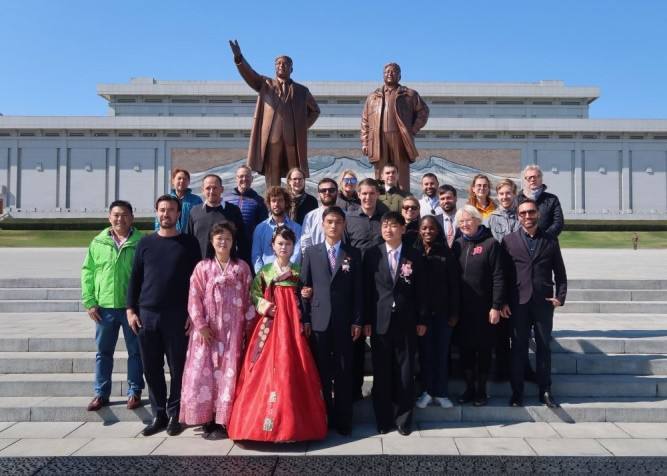According to industry insiders North Korea could soon increase the cost of visiting the country, as well as converting from the Euro to the US dollar to settle accounts.
In a post released by Young Pioneer Tours the company stated that their ““partners in North Korea and beyond” have indicated the DPRK will change its preferred currency for settling tour company accounts from euros to dollars.
Despite the Euro being the official foreign currency of choice in the Democratic Peoples Republic of Korea (DPRK), use of the Dollar, as well as Chinese Renimbi is widespread, with the country also needing US dollars to buy goods on the international market.
The rise in prices for tours would come via North Korea using a fixed exchange of 1 euro to US$1.20 despite the fact that the current exchange rate roughly floats at around 1-1.
This would mean an actual rise in the cost of a tour to North Korea of around 20 percent, which while it might seem to be a large increase, in actuality prices for tours have not been raised in over 15 years, despite the cost of global goods increasing greatly during this time.
Lack of tourists during the recent pandemic has also meant money not being spent on tourist infrastructure, with much of the extra revenue expected to go towards said investments.

Potential problems related to settling in US dollars
The potential move to settling of accounts in US dollars though has raised questions and concerns about compliance with US sanctions on North Korea, sanctions which many feel are barbaric in their intensity.
In essence and by the letter of the law foreign tourists and indeed travel agencies who visit North Korea would violate sanctions by paying for a tour to the country in US dollars.
According to North Korea sanctions expert Joshua Stanton who was quoted by NK News the changes would affect “various parts of the travel industry.”
“If a person deposits the proceeds of the tour business in an account controlled by the Foreign Trade Bank, and if the funds are wired through the U.S., the person could be prosecuted for money laundering or violations of the sanctions regulations. Even if the person processing the transactions isn’t a U.S. person or somehow evades U.S. jurisdiction, they could also be added to the specially designated nationals list and blocked from the financial system,” he explained.
An example of the “long arm of the US law” ks Spanish national Alejandro Cao de Benos, head of the Korean Friendship Association, who was arrested for among other things allegedly trying to sell weapons on behalf of the DPRK.
Since his troubles he has all, but been cut off from the financial system, as well as having the Federal Bureau of Investigation’s (FBI) going as far as putting fugitive posters up for both him and Christopher Emms. Both men are accused of roles in hosting a cryptocurrency conference in the DPRK, which according to the United States broke rules related to the draconian sanctions on North Korea.
And these measures would potentially not just harm American citizens, who are already barred by their government from entering the country, but also foreign nationals through secondary sanctions.
And while it may seem extreme, or unlikely if the US pushed hard enough it could feasibly mean people visiting or doing business within North Korea being frozen out of “private banks”.
Banks not only notoriously veer on the side of caution, but also have the ability as private companies to close the accounts of “undesirables”, as we recently saw with Nigel Farage in the United Kingdom.
Why does North Korea want to move to the US dollar?
The reason for North Korea wanting, or rather needing to move to the US dollar is more about pragmatism than choice.
The strength of the dollar and its relative stability compared to the Euro make it not only more appealing, but also in some ways a necessity.
Key foreign goods, such as oil are still largely traded in dollars, with the US arguably going to war in both Iraq and Libya in order to preserve what some refer to as the PetroDollar.
This though is a situation that has the potential to change and not in favour of the United States, with Russia and China, the two major trading partners of North Korea now settling many transactions in RMB, rather than the US dollar. China in particular has been a firm advocate in pushing the RMB as an alternative reserve currency, although its chances of replacing the dollar in the short=term at least are considered slim.
Russia for its part is also now insisting that buyers of its natural resources, particularly countries from the Eurozone do so in Russian Roubles, meaning more and more countries are seeking alternatives to being controlled by US financiers. And if the BRICS countries eventually do manage to set up a currency that can rival the dollar for the settling of international trade for oil and beyond, then the days of the United States being able to financially bully the nations of the world may well become a thing of the past.

